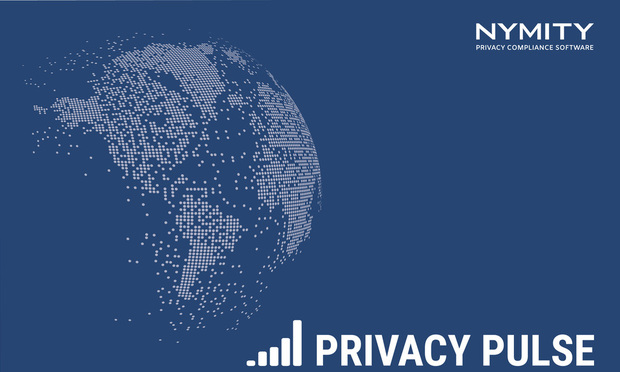New Study Reveals Privacy Compliance Education Gap
Almost half of the respondents ranked building a privacy program as a top priority, yet nearly 60% rated their company's privacy knowledge as being "moderate to very low."
July 17, 2019 at 04:28 PM
4 minute read
 (Courtesy photo)
(Courtesy photo)
Major data breaches and privacy snafus occurring on a regular basis have made it obvious that having a robust privacy compliance program should be a prime concern for businesses. But a new report suggests that companies still have a long way to go when it comes to being privacy savvy.
Toronto-based privacy compliance software company Nymity Inc. surveyed more than 100 privacy professionals, most of whom are either in-house counsel or privacy officers and are working in the U.S., for its Privacy Pulse study.
Almost half of the respondents ranked building a privacy program as a top priority, and more than 70% said privacy has become an integral part of the overall strategy and planning for their firms.
And yet nearly 60% of the respondents rated their company's privacy knowledge as being “moderate to very low.”
“This may seem surprising as one would expect that privacy programs would have been built in the run-up to the GDPR,” the study states, referring to the EU's General Data Protection Regulation.
“This could indicate that companies have been treating compliance as a tactical 'check list' item and are now struggling with how to handle privacy laws that just keep coming—particularly in the U.S. with the CCPA (California Consumer Privacy Act), Nevada, Texas, and numerous other states tabling legislation,” the report adds.
Teresa Troester-Falk, chief global privacy strategist at Nymity, wrote in an email that, until recently, “privacy was generally seen as a compliance matter that rested within legal or compliance departments and not a matter of broad concern for the business.
“This is beginning to change as privacy matters are front and center in the headlines and more and more corporate boards are learning that noncompliance with privacy laws is a matter of corporate liability, thus tasking the business with more responsibility,” she added.
The majority of respondents said they wanted to spend more time on privacy education, which makes sense. But nearly 70% said their privacy compliance time was being dominated by documenting policies and procedures and working on data inventory.
The study also revealed that many businesses might have difficulties with regulatory reporting. More than 75% of respondents said it would take them two or more days to report issues to regulators if required to do so.
“The vast majority of companies have approached privacy laws as a matter of strict compliance vs. accountability,” Troester-Falk noted. “That is, the focus of privacy 'work' has been on adherence to legal requirements, not to demonstrating compliance or reporting on it.”
But she added that “demonstrating compliance is now a legal obligation under [GDPR] and we will see more laws including this, and correspondingly there are more internal functions being created around reporting and more demand for reporting tools.”
Other findings from the report include:
- More than 80% of respondents indicated they were reporting on privacy matters and compliance status at regular intervals to their boards, and more than 40% were reporting quarterly.
- 71% believed that privacy will become increasingly integrated or embedded into business operations.
- 35% ranked continued CCPA compliance activities as a top priority, compared with 26% who were more concerned about continued GDPR compliance.
Read More:
Tech's Efforts to Diminish Landmark California Privacy Law Fizzle, for Now
UK's Recent GDPR Fines Signal Unified Enforcement Approach With EU
The Debate Over De-Identified Data: When Anonymity Isn't Assured
This content has been archived. It is available through our partners, LexisNexis® and Bloomberg Law.
To view this content, please continue to their sites.
Not a Lexis Subscriber?
Subscribe Now
Not a Bloomberg Law Subscriber?
Subscribe Now
NOT FOR REPRINT
© 2025 ALM Global, LLC, All Rights Reserved. Request academic re-use from www.copyright.com. All other uses, submit a request to [email protected]. For more information visit Asset & Logo Licensing.
You Might Like
View All
Advance Auto Parts Hires GC Who Climbed From Bottom to Top of Lowe's Legal Department
2 minute read
Compliance With EU AI Act Lags Behind as First Provisions Take Effect

State AG Hammers Homebuilder That Put $2,000-Per-Day Non-Disparagement Penalty in Buyer Contracts
3 minute read
NBA Players Association Finds Its New GC in Warriors Front Office
Trending Stories
- 1How Alzheimer’s and Other Cognitive Diseases Affect Guardianship, POAs and Estate Planning
- 2How Lower Courts Are Interpreting Justices' Decision in 'Muldrow v. City of St. Louis'
- 3Phantom Income/Retained Earnings and the Potential for Inflated Support
- 4Should a Financially Dependent Child Who Rejects One Parent Still Be Emancipated?
- 5Advising Clients on Special Needs Trusts
Who Got The Work
J. Brugh Lower of Gibbons has entered an appearance for industrial equipment supplier Devco Corporation in a pending trademark infringement lawsuit. The suit, accusing the defendant of selling knock-off Graco products, was filed Dec. 18 in New Jersey District Court by Rivkin Radler on behalf of Graco Inc. and Graco Minnesota. The case, assigned to U.S. District Judge Zahid N. Quraishi, is 3:24-cv-11294, Graco Inc. et al v. Devco Corporation.
Who Got The Work
Rebecca Maller-Stein and Kent A. Yalowitz of Arnold & Porter Kaye Scholer have entered their appearances for Hanaco Venture Capital and its executives, Lior Prosor and David Frankel, in a pending securities lawsuit. The action, filed on Dec. 24 in New York Southern District Court by Zell, Aron & Co. on behalf of Goldeneye Advisors, accuses the defendants of negligently and fraudulently managing the plaintiff's $1 million investment. The case, assigned to U.S. District Judge Vernon S. Broderick, is 1:24-cv-09918, Goldeneye Advisors, LLC v. Hanaco Venture Capital, Ltd. et al.
Who Got The Work
Attorneys from A&O Shearman has stepped in as defense counsel for Toronto-Dominion Bank and other defendants in a pending securities class action. The suit, filed Dec. 11 in New York Southern District Court by Bleichmar Fonti & Auld, accuses the defendants of concealing the bank's 'pervasive' deficiencies in regards to its compliance with the Bank Secrecy Act and the quality of its anti-money laundering controls. The case, assigned to U.S. District Judge Arun Subramanian, is 1:24-cv-09445, Gonzalez v. The Toronto-Dominion Bank et al.
Who Got The Work
Crown Castle International, a Pennsylvania company providing shared communications infrastructure, has turned to Luke D. Wolf of Gordon Rees Scully Mansukhani to fend off a pending breach-of-contract lawsuit. The court action, filed Nov. 25 in Michigan Eastern District Court by Hooper Hathaway PC on behalf of The Town Residences LLC, accuses Crown Castle of failing to transfer approximately $30,000 in utility payments from T-Mobile in breach of a roof-top lease and assignment agreement. The case, assigned to U.S. District Judge Susan K. Declercq, is 2:24-cv-13131, The Town Residences LLC v. T-Mobile US, Inc. et al.
Who Got The Work
Wilfred P. Coronato and Daniel M. Schwartz of McCarter & English have stepped in as defense counsel to Electrolux Home Products Inc. in a pending product liability lawsuit. The court action, filed Nov. 26 in New York Eastern District Court by Poulos Lopiccolo PC and Nagel Rice LLP on behalf of David Stern, alleges that the defendant's refrigerators’ drawers and shelving repeatedly break and fall apart within months after purchase. The case, assigned to U.S. District Judge Joan M. Azrack, is 2:24-cv-08204, Stern v. Electrolux Home Products, Inc.
Featured Firms
Law Offices of Gary Martin Hays & Associates, P.C.
(470) 294-1674
Law Offices of Mark E. Salomone
(857) 444-6468
Smith & Hassler
(713) 739-1250






